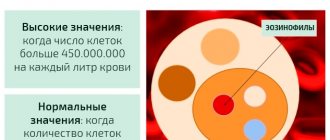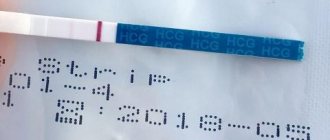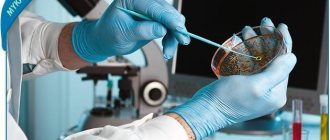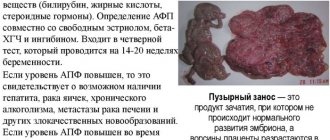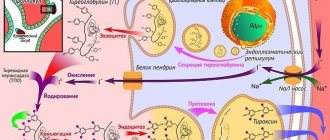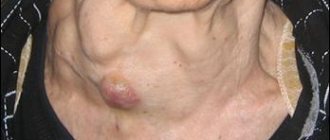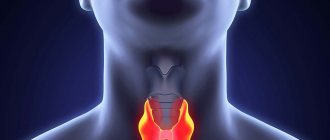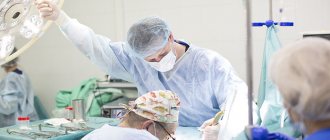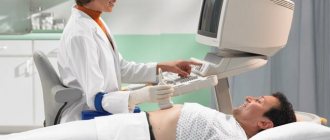Hormonal disorders of the thyroid gland are a sign of the development of serious pathologies in the body. According to statistics, such disruptions in the endocrine system occupy second place in the world after diabetes mellitus. Therefore, it is important to regularly visit an endocrinologist to monitor hormone levels and timely diagnosis of thyroid pathologies.
COST OF SOME ENDOCRINOLOGIST SERVICES IN OUR CLINIC IN ST. PETERSBURG
| Price for a detailed examination of thyroid hormones (8 tests) | 5020 rub. |
| Endocrinologist appointment | 1000 rub. |
| Ultrasound of the thyroid gland | 1000 rub. |
| Call free: 8-800-707-1560 *The clinic is licensed to provide these services | |
Structure of the thyroid gland
The thyroid gland is located on the front surface of the neck, below the thyroid cartilage. It consists of two halves and an isthmus. The isthmus is absent in 15% of cases, then the lobes are connected by a connective tissue bridge. Directly behind the thyroid gland lie 4 parathyroid glands, which secrete parathyroid hormone.
The structural unit of the thyroid gland is the follicle. It is a cavity surrounded by a number of follicular cells (thyrocytes). At its center is a special substance called a colloid. Diffusely scattered parafollicular or calcitonin-producing C cells and blood vessels are found between the follicles.
What is ultrasound?
Ultrasound (ultrasound, sonography) is a procedure for examining the body using ultrasonic waves.
Their frequency is about 20,000 Hz, which is higher than what the human ear can perceive. This test is safe for the body and can be performed frequently if necessary. The thyroid gland produces iodine-containing hormones and stores iodine. It consists of two lobes and an isthmus and is located in the front of the neck. Its proper operation is extremely important for the normal functioning of the entire body, and violations lead to a number of diseases: cancer, Graves' disease, cretinism, adenoma, myxedema, etc.
An ultrasound of this gland allows you to find out what condition it is in, whether there are any pathologies or neoplasms. It shows changes in its structure, which can cause various health problems.
How are thyroid hormones formed?
All thyroid derivatives are formed by iodination of the amino acid tyrosine. The microelement iodine enters the body of a healthy person from consumed products, both plant and animal origin. A person should take 135-155 mcg of this substance per day.
From the intestines with the blood, the microelement enters the follicular cells of the thyroid gland. Thyroglobulin is a collection of amino acid tyrosine residues. This is a kind of matrix for the formation of hormones. Thyroglobulin is stored in the follicle colloid.
When the body requires thyroid hormones, iodine is incorporated into thyroglobulin using the enzyme thyroid peroxidase. The final products of biosynthesis are thyroxine (T4) and triiodothyronine (T3), which differ in iodine content (4 and 3 microelement atoms, respectively).
To determine thyroid function, in addition to the above hormones, they also look at:
- thyroid-stimulating hormone;
- thyrotropin-releasing hormone;
- thyroglobulin;
- thyroxine-binding globulin;
- antibodies to thyroglobulin;
- antibodies to thyroid peroxidase.
Prevention
In order to prevent thyroid diseases associated with hormonal imbalance, or eliminate minor disruptions, it is necessary to ensure that the body receives a sufficient amount of tyrosine and iodine from food.
The main iodine-containing products are sunflower oil, iodized salt, kelp seaweed, crabs, fish (oceanic), shrimp, squid, etc. Tyrosine is found in eggs, milk, peanuts, peas, and beans. Maintaining hormonal balance is the key to a healthy thyroid gland. And all you need for this is a complete and balanced diet. Also, do not forget about regular visits to the endocrinologist. Checking once every 3 months is sufficient.
If you find an error, please select a piece of text and press Ctrl+Enter
General information about thyroid hormones
Thyroid cells secrete approximately 16-23 times more thyroxine compared to T3. However, T4 is 4-7 times less active than triiodothyronine. Some scientists believe that thyroxine does not even have its own hormonal activity and is simply a precursor to T3. Entering the blood, thyroid hormones can be in free and bound states. They connect to a special carrier – thyroxine-binding protein. In this case, only free fractions of thyroid hormones are active. The main functions of iodothyronines include:
- increased heat production and oxygen consumption in all tissues of the body (with the exception of the brain, testicles and spleen);
- stimulation of the synthesis of building proteins;
- increasing the body's need for vitamins;
- strengthening of nervous and mental activity.
Types and characteristics
The main hormones of a healthy thyroid gland are involved in tissue oxygen consumption, energy production and neutralization of free radicals. Analysis of individual components allows us to determine the deviation in women of interrelated components:
- TSH (thyroid hormone) is a thyroid regulator produced in the pituitary gland at the base of the brain.
- T4 and T3 (thyroxine and triiodothyronine) - the hormones of the thyroid gland under study are released at the command of TSH, stimulate the development and growth of the body, and activate physical and mental processes in women.
- TPO is an immune autoantibody produced against an important gland enzyme, thyroid peroxidase (anti-TPO).
Indications for the purpose of analysis
- diagnosis and control of treatment of thyroid diseases;
- atrial fibrillation;
- a sharp decrease or increase in body weight;
- sexual dysfunction, lack of sexual desire;
- delayed mental development in children;
- pituitary adenoma;
- baldness;
- infertility or absence of menstruation.
Preparing for a thyroid hormone test
- on the eve of the study, physical activity and sports should be avoided;
- before taking a blood test for hormones, you should not drink alcohol, strong tea and coffee, and not smoke for at least a day;
- 1 month in advance you need to stop taking medications with thyroid hormones (if the disease allows);
- It is recommended to stop taking medications containing iodine 2-3 days before;
- blood must be taken on an empty stomach, while the patient is at rest;
- When collecting material, it is not recommended to apply a venous tourniquet;
- Before the analysis, ultrasound of the thyroid gland, radioisotope scanning and biopsy cannot be performed.
Hyperthyroidism
An overactive thyroid gland causes predominantly opposite symptoms:
- endemic goiter - the thyroid gland has increased in size;
- hair began to fall out rapidly and nails began to break;
- bulging eyes appeared;
- sudden outbursts of aggression, nervousness, anxiety;
- irritability gives way to tearfulness;
- tremors in the hands;
- increased sweating;
- rapid weight loss;
- causeless fatigue and weakness, insomnia;
- increased body temperature (at low temperatures a person is not cold);
- increased heart rate (tachycardia);
- suffers from diarrhea;
- dystrophic changes in the liver (with a long course of the disease);
- in severe cases, women experience uterine bleeding, and men experience changes in the testicles and prostate gland, decreased libido.
One of the most common causes of the disease is Graves' disease, an autoimmune disease that causes the body to produce autoantibodies that activate the secretion of thyroid hormones. Also, overactivity of the gland can be caused by Hashimoto's thyroiditis, toxic, taking certain medications or supplements with a high iodine content, etc.
Hyperthyroidism can usually be diagnosed and treated in a clinic without the need for hospitalization. Various types of treatment are possible: pharmacological, surgical, with radioactive iodine and, in the case of toxic adenoma, by alcoholization. The doctor prescribes the most appropriate therapy depending on the specific pathology.
Normal blood test for hormones
| Index | Designation | Indicator norm |
| Thyroid-stimulating hormone (TSH) | TSH | 0.47-4.15 mIU/l |
| Total triiodothyronine, total T3 | TT3 | 1.06-3.14 nmol/l |
| Free triiodothyronine | FT3 | 2.62-5.77 nmol/l |
| General thyroxine | TT4 | Men – 60.77-136.89 nmol/l Women – 71.23-142.25 nmol/l |
| Free thyroxine | FT4 | 9.56-22.3 pmol/l |
| Thyroglobulin | TG | Less than 60.08 ng/ml |
| Thyroxine binding globulin | TCG | 222-517 nmol/l |
| Thyroid Hormone Uptake Test | 24-35% | |
| Antibodies to thyroglobulin | AT-TG | Title less than 1:10 |
| Antibodies to thyroid peroxidase | AT-TPO | Less than 5.67 U/ml |
Thyrotropin and threats of deviations
TSH is a thyroid-stimulating hormone of the female thyroid gland, synthesized by the pituitary gland to stabilize the amount of T4 and T3 in the vessels. They actively accelerate the growth of gland cells.
A decrease in the norm of T4 and T3 is possible with injuries to the pituitary gland. Excess TSH is inevitable in hypothyroidism, poor adrenal function, tumor formation and mental disorders.
| TSH, normal | ||
| Age, years | med/l | µm/ml |
| 1 — 6 | 0,6-5,96 | |
| 7 — 11 | 0,5-4,83 | |
| 5 — 14 | 0,41 – 4,9 | |
| 12 — 18 | 0,50-4,2 | |
| From 14 | 0,41 – 4,9 | |
| From 20 | 0,26-4,1 | |
| Pregnancy | 0,20-4,50 | |
How can thyroid disease be recognized by hormone analysis?
| Disease | TSH | T3 general and free | T4 general and free | Thyroglobulin | Thyroxine-binding globulin | AT to thyroglobulin and AT to thyroid peroxidase | |
| Thyrotoxicosis (diffuse toxic goiter) | |||||||
| short | norm | norm | Are rising | Are rising | Are rising | |
| short | norm | high | Promoted | Promoted | Are rising | |
| short | high | norm | Are rising | Are rising | Are rising | |
| Hyperplasia of the thyroid gland (adenoma of glandular tissue) | Reduced | Are rising | Promoted | Promoted | Do not change | ||
| Hypoplasia of the thyroid gland (Endemic goiter) | Increased or normal | Increased or normal | Sharply reduced | Promoted | Promoted | Are rising | |
| Hypothyroidism | Promoted | Concentration decreases | Promoted | Reduced | Are rising | ||
| Autoimmune thyroiditis | Increased | In the early stages, T3 and T4 are elevated; with depletion of the thyroid gland, these indicators sharply decrease | Promoted | Promoted | Increased (ATs to the TSH receptor are additionally determined) | ||
| Thyroid cancer | Increased | Reduced or normal | Promoted | Reduced | Do not change | ||
What do T4 changes indicate?
The main source of T4 is the thyroid gland, therefore, along with TSH readings, the amount of tetraiodothyronine directly indicates hypo- or hyperthyroidism.
A decrease in indicators indicates:
- hypothyroidism;
- atrophic thyroiditis;
- nephrotic syndrome;
- gastrointestinal diseases in which significant protein loss occurs.
Excessive production of total and free tetraiodothyronine is observed during pregnancy, during treatment with the artificial drug thyroxine, as well as in obesity.
An increase in T4 levels indicates the development of the following diseases:
- hyperthyroidism;
- toxic thyroiditis;
- hepatitis.
During pregnancy, the norm of total and free T4 for women increases, since the normal development of the fetus depends on the level of tetraiodothyronine. In women during pregnancy, an increase in T4 is accompanied by symptoms of rapid heartbeat, frequent bouts of hunger and headache. In the second and third trimester, free thyroxine decreases to normal.
Thyroid-stimulating hormone
Thyroid-stimulating hormone is not a thyroid hormone. It is produced in the anterior lobe of the pituitary gland. Its main function is to stimulate the thyroid gland. TSH increases blood supply to the gland and increases the supply of iodine to the follicles.
TSH production is controlled by:
- hormones of the main gland of the body - the hypothalamus - thyroid-stimulating releasing factors;
- thyroid hormones according to the feedback principle;
- somatostatin;
- biogenic amines.
TSH norms at different ages:
| Person's age | Normal indicator |
| Newborns | 1.12-17.05 mIU/l |
| First year of life | 0.66-8.3 mIU/l |
| 2-5 years | 0.48-6.55 mIU/l |
| 5-12 years | 0.47-5.89 mIU/l |
| 12-16 years old | 0.47-5.01 mU/l |
| Adults | 0.47-4.15 mIU/l |
TSH is characterized by daily fluctuations in secretion: the most of it is released at 2-3 am, and the smallest amount is usually at 17-18 o'clock. If a person’s sleep-wake pattern is disrupted, the rhythm of TSH synthesis is also disrupted.
The reason for the change in normal TSH concentration?
| Promotion | Decline |
|
|
TSH hormone is elevated - what does this mean?
Only a doctor can decipher the results of the analysis, conduct further research and make an accurate diagnosis. However, let's try to figure out what deviations in the TSH indicator from the norm in the analysis can indicate.
Symptoms of elevated thyrotropin
An increased level of TSH in a person’s blood is manifested by the following external signs and symptoms:
- irritability;
- anxiety;
- sleep problems;
- decreased body temperature;
- fatigue and weakness;
- pale skin;
- decreased visual acuity;
- deterioration of thinking abilities, concentration;
- an increase in the size of the thyroid gland;
- tremor.
Causes and consequences of elevated TSH in women
So, if tests show that the TSH level is elevated, then this may indicate the following diseases:
- disruption of the central nervous system;
- adrenal dysfunction;
- tumor in the pituitary gland;
- autoimmune thyroiditis (Hashimoto's goiter);
- hypothyroidism of various etiologies (lack of thyroid hormones);
- syndrome of unregulated TSH secretion;
- thyroid hormone resistance syndrome;
- gestosis (severe toxicosis in late pregnancy).
Other pathologies may also be identified. It is also possible that the patient took medications that can affect TSH levels (in particular, levodopa, dopamine, steroid and thyroid hormones, aspirin), suffered severe stress or heavy physical activity.
The woman who underwent the TSH test may not have known about her pregnancy, and in expectant mothers, as is known, deviations in the level of this hormone are considered a common occurrence. In addition, after cholecystectomy (surgery to remove the gallbladder) and after hemodialysis, TSH levels increase. In any case, it is necessary to consult a qualified endocrinologist who will identify the true reasons for the increase in TSH levels.
Free and total triiodothyronine
Total triiodothyronine includes protein-bound and free T3. T3 is a very active substance. Its release is characterized by seasonal fluctuations: the peak of its release occurs in the autumn-winter period, and the minimum level is observed in the summer.
Norms of total T3 at different ages:
- 1-10 years – 1.79-4.08 nmol/l;
- 10-18 years – 1.23-3.23 nmol/l;
- 18-45 years – 1.06-3.14 nmol/l;
- Over 45-50 years old – 0.62-2.79 nmol/l.
Why does the indicator of total and free triiodothyronine change?
| Increase | Decrease |
|
|
Norm of triiodothyronine by age in women: table
For women, normal values of free T3 fraction are 10% lower than for men. This is due to differences in the structure of the organs of the reproductive system. In pregnant women, T3 fluctuates depending on the phase of intrauterine development of the fetus. It reaches normal values only 7-8 days after the birth of the child.
The triiodothyronine level is different for children and adults. The constant concentration of the hormone stabilizes during puberty - by the age of 13-15. In women over 65 years of age, T3 sharply decreases due to the decline of ovarian function and age-related changes in the body.
Normal values of free T3 fraction in women:
| Age, years | Lower threshold, pmol/l | Upper threshold, pmol/l |
| 4 day – 1 year | 3.6 | 7.5 |
| 1-12 | 4.3 | 6.8 |
| 12-15 | 3.8 | 6.2 |
| 15-19 | 3.7 | 5.7 |
| 20-50 | 2.6 | 5.7 |
| after 50 | 0.63 | 2.8 |
In women in the first trimester of pregnancy, T3 increases. This is due to the active formation of the internal organs of the fetus. Starting from the 13th week of gestation, its concentration gradually decreases. High T3 levels indicate endocrine disorders.
When assessing the functioning of the endocrine system in pregnant women, the level of free T3 must be measured. Total triiodothyronine in most cases increases greatly due to the increased production of proteins by the body of the woman and the fetus.
Free and total thyroxine
Thyroxine, both total and free, reflects thyroid function. The peak of its content in the blood occurs from 8 to 12 o'clock in the afternoon and in the autumn-winter period. The level of the hormone decreases mainly at night (from 23 to 3 o'clock) and in the summer. In women, the level of thyroxine exceeds its content in men, which is associated with reproductive function.
Reasons for changes in the level of total and free T4:
| Promotion | Decline |
|
|
How to get it back to normal
Treatment for highly elevated AT-TG is symptomatic. This means that patients are prescribed medications to restore the functioning of the thyroid gland. It is also necessary to adjust your lifestyle. In serious situations, surgery is performed.
Medications
Medicines are selected by an endocrinologist after a medical examination based on the results obtained. You should not take medications on your own, as this can cause serious consequences. Many drugs cause side effects.
| Group of drugs | Name | Application |
| Nonsteroidal anti-inflammatory drugs | Indomethacin, Almiral | The medicine is taken orally, without chewing, with a sufficient amount of water. The adult dosage is 25 mg 2-3 times a day. If necessary, the amount of medication is increased to 100 mg, divided into 4 doses. |
| Hormonal drugs | Levothyroxine, Euthyrox | The drug is taken in the morning on an empty stomach 30 minutes before meals. The daily dosage for an adult is 1.6-1.8 mcg/kg. The course of therapy is selected individually in each case. |
| Decreased synthesis of T3 and T4 | Metizol, Tyrozol | The medicine is taken with or after meals. Depending on the patient’s condition, an adult patient is prescribed 10-40 mg per day. |
Additionally, the endocrinologist recommends that patients take vitamin complexes. Hormonal drugs improve blood supply to the brain and mental abilities.
Traditional methods
Recipes from witch doctors and healers are used in the absence of serious inflammatory and degenerative processes. It is recommended to discuss alternative treatment with your doctor to prevent negative consequences.
| Name | Recipe | Application |
| Herbal collection | Mix valerian roots, lemon balm, yarrow and adonis in equal parts. Pour 2 tbsp. herbal mixture with hot water (1 tbsp.). Leave for 30 minutes and strain. | The prepared solution is taken orally 100-150 ml 2-3 times every day. |
| Wormwood compress | Pour dry grass (200 g) with pork lard (200 g). Mix all ingredients well. | The finished product is used for a compress. Apply warm to the neck before bedtime. The course of therapy lasts 2 weeks. The compress relieves discomfort well and eliminates pain. |
| Sea kale tincture | Mix 50 g of seaweed, 25 g of pine buds, 2-3 plantain leaves, honey and lemon. Place the resulting mass in a water bath and heat for 30 minutes. | It is recommended to take 1 tbsp of seaweed tincture. 3 times a day before meals 30 minutes. The minimum course of treatment lasts 30 days. |
Folk remedies can restore hormonal balance and eliminate mental and emotional disorders. Therapy is carried out comprehensively, together with medications.
Other methods
AT-TG is greatly elevated - this means it’s time to take a closer look at your health. Patients with changes in the level of antibodies to thyroglobulin are advised to adhere to a healthy lifestyle. This is, first of all, giving up bad habits (alcohol, cigarettes, drugs), eliminating stress and eating healthy.
| Recommended Products | Prohibited Products |
|
|
The drinking regime involves drinking at least 3 liters of liquid every day.
In cases where drug therapy does not produce positive dynamics, the person’s condition worsens due to the progression of pathological processes, the patient undergoes surgical intervention.
Main indications for surgery:
- malignant tumor in the tissues of the thyroid gland;
- increase in diffuse goiter;
- development of adenoma;
- benign neoplasm.
After surgical treatment, the patient is prescribed hormonal drugs (Thyroxine) so that the body receives hormones.
Thyroglobulin
Thyroglobulin (TG) is a substrate for the formation of thyroid hormones. The main indication for its determination is the detection of thyroid cancer and monitoring its curability (as a tumor marker). The main reason for the increase in thyroglobulin is a tumor of the thyroid gland with high functional activity. Its concentration decreases when:
- thyrotoxicosis;
- thyroiditis;
- benign thyroid adenoma.
When to see a doctor
Progressive pathological processes provoke degeneration of thyroid tissue. A timely visit to a specialist will prevent complications, reduce the risk of relapse if it is cancer, and reduce the amount of surgical intervention.
An endocrinologist should be visited when the first disturbances and signs of a pathological condition appear. Taking into account the results of the examination and the cause of the problems, you may additionally need to consult other specialized specialists (oncologist, obstetrician-gynecologist, surgeon, therapist).
Thyroxine binding globulin
Thyroxine-binding globulin (TBG) transports iodothyronines in the blood to all cells in the body. Reasons for changes in the normal concentration of TSH:
| Promotion | Decline |
|
|
Thyroid Hormone Uptake Test
This technique is used to determine the function of the thyroid gland (hypo- or hyperthyroidism). For the study, a person is given radioactive iodine with a special label to drink. The tag allows you to trace the path of the microelement in the body, the degree of its absorption by the thyroid gland, and, as a result, its function. High iodine uptake is observed in thyrotoxicosis, low - in hypothyroidism.
Hypothyroidism
Deficiency of thyroid hormones causes the following symptoms, which are the reason for an urgent visit to an endocrinologist:
- Depression and fatigue, especially when waking up and resting, loss of memory, concentration and learning ability, drowsiness, apathy, disinterest, decreased speed of thought and speech, alternating with nervousness and hyperactivity;
- Dry and pale skin, hair loss and dryness, thinning of the outer eyebrows, brittle nails with grooves, constipation, poor digestion, low body temperature, poor sweating in the heat;
- High risk of infection, weakened immune defense and predisposition to cancer;
- Decreased insulin sensitivity, metabolic syndrome, slow heartbeat, increased cholesterol and diastolic pressure, atherosclerosis, increased risk of death from heart disease (heart failure, coronary artery disease, arrhythmias);
- Night muscle cramps, myalgia, pain and stiffness (especially in the morning), headache, menstrual irregularities, uterine bleeding, infertility, tendency to terminate pregnancy, decreased tendon reflexes, enlarged thyroid gland (endemic goiter).
Reduced thyroid function will have consequences in many other hormonal areas. In particular, hypothyroidism creates a stressful situation that stimulates the adrenal glands, contributing to its development towards decompensation. “Adrenal fatigue” and hypothyroidism are often related (in 80% of cases) and aggravate each other.
The most common causes of hypothyroidism are autoimmune diseases (Hashimoto's thyroiditis), iodine deficiency, and problems with the hypothalamus and pituitary gland (the rarest hypothesis).
Hypothyroidism is an irreversible pathology. This means that the thyroid gland cannot resume its regular functioning. For this reason, the therapy taken is defined as “replacement”, in the sense that it is intended to replace hormones that the thyroid gland can no longer produce.
Antibodies to thyroglobulin and thyroid peroxidase
The detection of these antibodies indicates an autoimmune process, that is, the immune system begins to produce immunoglobulins against its own structures. Antibodies to thyroglobulin and thyroid peroxidase are detected when:
- Graves' disease;
- Down syndrome;
- Turner syndrome;
- subacute thyroiditis (de Crevena);
- postpartum thyroid dysfunction;
- chronic Hashimoto's thyroiditis;
- idiopathic hypothyroidism;
- autoimmune thyroiditis;
- prescribed to newborns with a high titer of AT in the mother.
In these diseases, the antibody titer can be increased 1000 times or more, which is an indirect indicator of the activity of the autoimmune process.
What is the danger of impaired triiodothyronine secretion?
Fluctuations in thyroid hormones in women can cause disruptions in the functioning of vital systems. Possible consequences of elevated T3 include:
- anorexia;
- pathological protrusion of the eyes;
- heart failure;
- thyroid diabetes;
- heat intolerance;
- indigestion;
- liver enlargement;
- osteoporosis;
- infertility.
Lack of triiodothyronine in women is accompanied by disruption of the central nervous system, decreased immunity, and fetal abnormalities during pregnancy. The most dangerous complications include:
- intestinal obstruction;
- progressive inhibition of the central nervous system;
- acute urinary retention;
- atherosclerosis;
- myocardial infarction.
Hypothyroidism in women is dangerous due to the progression of infectious diseases, autoimmune disorders and oncology.
Changes in thyroid hormones in old age and pregnancy
| Hormone | Elderly age | Pregnancy |
| Thyroid-stimulating hormone | In old age, its content in the blood increases slightly, and its release at night also decreases. | TSH concentration increases (normally up to 2) |
| Triiodothyronine total and free | In women and men over 65 years of age, it decreases in blood and plasma | The content of free T3 decreases from the 1st to the 3rd trimester |
| Total and free thyroxine | Doesn't change | Thyroxine levels increase during pregnancy (especially in the 3rd trimester); |
| Thyroglobulin | Doesn't change | |
| Thyroxine-binding globulin | The amount of thyroxine-binding globulin increases by 2 times or more | |
| AT to thyroglobulin and thyroid peroxidase | Not defined | With the development of autoimmune thyroiditis in pregnant women, high titers of antibodies to TG and TPO are detected |
Author:
Selezneva Valentina Anatolyevna physician-therapist
Symptoms of increased TSH
Manifestations from the nervous system
The person becomes agitated, even aggressive, fussy, and suffers from sudden mood changes. His hands often shake, he cannot concentrate, and he suffers from memory impairment. Depression often occurs.
Manifestations from the cardiovascular system
The main symptoms are an increase in the number of heartbeats and the occurrence of interruptions in the functioning of the heart. This forces a woman to contact a cardiologist, and treatment is often prescribed without examining the thyroid gland, which entails disastrous consequences.
Manifestations from the gastrointestinal tract
The acceleration of metabolism causes the patient to overeat, but at the same time not to gain, but to lose weight. He suffers from frequent digestive disorders, in particular diarrhea.
Manifestations from the reproductive system
Excess TSH often causes amenorrhea, that is, cessation of menstruation, which, in turn, leads to temporary or permanent infertility. However, during pregnancy, TSH may naturally increase, and in this case we are not talking about pathology.
Appearance Features
Such a person’s hair is brittle, dull, thinning, his skin is dry, pale, prone to cracking.
The condition of the eyeballs is characteristic: they are bulging and hard. The woman sees worse, she is tormented by swelling, especially in the morning, up to the formation of bags under the eyes.
Redness of the skin in the area where the thyroid gland is located may appear, and in the case of intensive development of the disease, a goiter, that is, its enlargement. In advanced cases, the thyroid gland reaches a kilogram in weight, while normally its weight is 20-25 grams.
General state
Due to increased metabolism, the patient often feels hot and sweats even in cool places.
